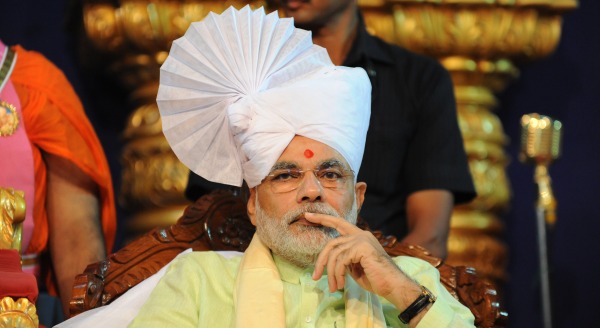- +1
Sumitra Badrinathan, Devesh Kapur, Andy Robaina, …
{
"authors": [
"Milan Vaishnav"
],
"type": "legacyinthemedia",
"centerAffiliationAll": "dc",
"centers": [
"Carnegie Endowment for International Peace"
],
"collections": [],
"englishNewsletterAll": "",
"nonEnglishNewsletterAll": "",
"primaryCenter": "Carnegie Endowment for International Peace",
"programAffiliation": "SAP",
"programs": [
"South Asia"
],
"projects": [],
"regions": [
"South Asia",
"India"
],
"topics": [
"Political Reform",
"Economy"
]
}
Source: Getty
Talking Democracy in India
Narendra Modi's re-election in Gujarat sets the stage for a national campaign in the upcoming Lok Sabha elections, but has also sparked a productive conversation about different approaches to development in India.
Source: Foreign Affairs

Although Modi's entry into national politics could further polarize India, it also carries a silver lining -- one even his detractors should acknowledge. For perhaps the first time in recent memory, an Indian election campaign promises to focus on substantive issues of development and democracy instead of the usual fare of caste politics and clientelism.
This fall, during the run-up to the state election, Modi and his BJP compatriots campaigned heavily on their stewardship of Gujarat's economy. They pointed to the state's high growth rates (between 2001 and 2010, its economy grew an average of over 10 percent each year) and favorable business climate (a recent study found that 12.5 percent of outstanding private-sector investments in India are earmarked for Gujarat). Critics, meanwhile, argued that the state's pro-growth record predates Modi -- according to one estimate, Gujarat recorded the highest rate of growth between 1988 and 2003, a boom for which Modi, who took office in 2001, can hardly claim full responsibility. Further, they maintained, growth in the last few years was thanks primarily mostly to the follow-on effects of national economic liberalization in the early 1990s. In those years, Manmohan Singh, who is the current prime minster but was finance minister at the time, deregulated the private sector, reduced trade barriers, and opened up the economy to greater foreign investment.
All this was to the benefit of Gujarat, which has an entrepreneurial ethos, a large foreign diaspora, and a vast coastline. In the Times of India, one Gujarati businessman recently compared Modi's role in Gujarati's good fortunes to icing a cake: "You have a nice cake and Modi has done a lot of good icing." The debate during the election had no conclusive end, but that in and of itself was not a bad thing: It produced thoughtful policy papers, opinion pieces, and even books by both sides. Voters, too, got in on the discussion of how GDP is calculated and whether it is the best measure of a state's performance.
The fight over Modi's economic legacy also broadened into a larger debate over social welfare. Modi's critics argued that despite high growth rates, Gujarat fares very poorly on a litany of human development indicators. From rates of malnutrition to rates of literacy and infant mortality, Gujarat ranks in the middle or near the bottom of India's states. Modi's retort is that Indians should focus not on Gujarat's absolute position on the scale but on the trends, many of which are improving. He also reiterates that the best solution to Gujarat's developmental failings -- as well as those of India as a whole -- would be to concentrate on pro-growth policies in the hope that the benefits will trickle down to the masses. Modi's opponents disparage his focus on "elite growth," the worst symbol of which, in their eyes, is his dogged courtship of India's biggest business families. This debate, too, would not have seemed out of place in an advanced industrial democracy such as the United States.
Beyond economics, the election season sparked a passionate conversation about just how liberal India's democracy should be. Those who believe that democracy has been too unruly -- pointing to, for instance, its dysfunctional judiciary, fragmented party system, and burdensome bureaucracy -- cheered Modi's ambition to construct, in the words of his supporters, "India's little Singapore." They applauded his decisive, CEO-style of governing and celebrated his aptitude for attracting domestic and foreign investors. His detractors, however, lamented the fact that Modi has skillfully quashed checks and balances on his authority by restricting other voices within his own party and refusing to appoint anyone to the powerful position of lokayukta (anti-corruption ombudsman), preferring instead to leave the post vacant. Meanwhile, Modi has taken India's already highly personality-driven politics to the extreme: On the stump, he repeatedly urged adoring crowds to select him, not the BJP, instructing them: "Vote for [me], the one you have known for 11 years." In a stunning display of savvy electioneering, Modi used 3-D technology to beam his holographic image simultaneously to 52 rallies across the state. In the words of the political scientist Christophe Jaffrelot, with the exception of former Prime Minister Indira Gandhi, "never before had an Indian politician saturated the political space the way [Modi] did" during the 2012 campaign.
Accompanying the discussion about liberalism was one about majoritarianism. Modi's backers boasted of his unabashed Hindu nationalism, but also reminded critics that there has been no significant outbreak of communal violence in the past decade (the Gujarati metropolis of Ahmedabad nevertheless holds the dubious distinction as the most riot-affected city in post-independence India). Of course, as critics point out, in the aftermath of the 2002 violence, there have also been no real attempts to reconcile Gujarat's Hindu majority with its Muslims, who comprise nearly ten percent of the state's population. Despite carrying out a series of fasts to promote statewide peace, the BJP neither nominated a single Muslim candidate nor put forward any inclusionary policies, such as social programs that would benefit the largely urban Muslim poor or encourage less segregation. Instead, the state's growing ghettos, including Juhapura, home to over 300,000 Muslims, and Citizen Nagar, home to Muslims displaced by communal violence and a huge municipal trash dump, continue to grow in size while their residents struggle for access to basic services such as education and clean water. That neglect did not likely have a material effect on the election outcome -- as a voting bloc, Muslims in Gujarat are too small and disorganized to have a dramatic impact -- but Modi's record on issues of concern to Muslims will be hotly debated if he competes for the nation's top job.
If the BJP backs Modi as its candidate for prime minster, it could inflame social, religious, economic, and political divisions. But it could also provoke a real debate about what kind of India its 1.2 billion citizens want. Given the fierce debate over Gujarat's economic and social legacy, a Modi candidacy could prompt questions about the most effective policies the government can pursue to attract growth, sustain private investment, ensure that rapid growth can be translated into rapid human development, and protect the rights of the disadvantaged. Such debates about substantive issues are hard to come by in developing democracies, where the temptations of populism and demagoguery are rife. Indeed, in India, the middle class has historically maintained an arm's length relationship with politics. In recent months, there have been tremors of its awakening, leading to vociferous protests on issues ranging from gender violence to corruption. The rise of Modi, who is fodder for a hearty debate if nothing else, could pull them yet further into the national conversation, making India's democracy all the stronger.
About the Author

Director and Senior Fellow, South Asia Program
Milan Vaishnav is a senior fellow and director of the South Asia Program and the host of the Grand Tamasha podcast at the Carnegie Endowment for International Peace. His primary research focus is the political economy of India, and he examines issues such as corruption and governance, state capacity, distributive politics, and electoral behavior. He also conducts research on the Indian diaspora.
- Indian Americans Still Lean Left. Just Not as Reliably.Commentary
- Indian Americans in a Time of Turbulence: 2026 Survey ResultsPaper
- +1
Milan Vaishnav, Sumitra Badrinathan, Devesh Kapur, …
Recent Work
Carnegie does not take institutional positions on public policy issues; the views represented herein are those of the author(s) and do not necessarily reflect the views of Carnegie, its staff, or its trustees.
More Work from Carnegie Endowment for International Peace
- India Signs the Pax Silica—A Counter to Pax Sinica?Commentary
On the last day of the India AI Impact Summit, India signed Pax Silica, a U.S.-led declaration seemingly focused on semiconductors. While India’s accession to the same was not entirely unforeseen, becoming a signatory nation this quickly was not on the cards either.
Konark Bhandari
- Beijing Doesn’t Think Like Washington—and the Iran Conflict Shows WhyCommentary
Arguing that Chinese policy is hung on alliances—with imputations of obligation—misses the point.
Evan A. Feigenbaum
- A China Financial Markets PostCommentary
Description of the post.
Michael Pettis
- The Kremlin Is Destroying Its Own System of Coerced VotingCommentary
The use of technology to mobilize Russians to vote—a system tied to the relative material well-being of the electorate, its high dependence on the state, and a far-reaching system of digital control—is breaking down.
Andrey Pertsev
- Indian Americans Still Lean Left. Just Not as Reliably.Commentary
New data from the 2026 Indian American Attitudes Survey show that Democratic support has not fully rebounded from 2020.
- +1
Sumitra Badrinathan, Devesh Kapur, Andy Robaina, …










